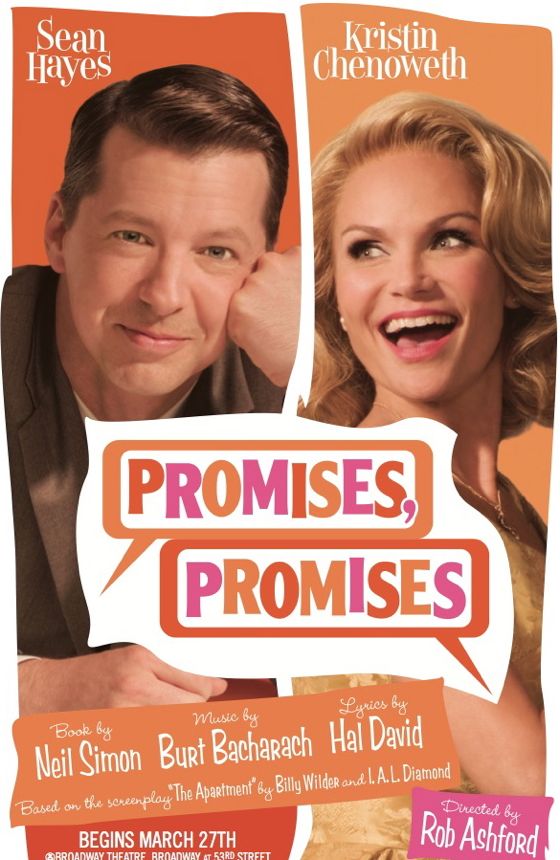
My friends Mary and Paul Zahl made a lightning raid on New York City recently (from Florida!) to see the Broadway revival of Promises, Promises. Here is Paul's report on the show:
LITTLE NOT BIG, THEREFORE BIG
I think critics make a mistake when they bring ideology to a production
of the theater. In the case of the new revival of the 1968 musical Promises, Promises
by Burt Bacharach and Hal David, with book by Neil Simon, a lot of
ideology has flowed out on paper. A lot of energy has flown, for
example to the performance of Sean Hayes, the lead actor, and whether
a gay actor can portray a non-gay hero.
Energy has also flown to the attitudes, within the story, concerning
relationships in the work place between men and women, attitudes that
are supposedly typical of the 1950s and early 1960s and no longer of
today. (The musical was written and first performed in 1968, although
it is closely based on Billy Wilder's 1960 film The Apartment, which he co-wrote with I. A. L. Diamond.)
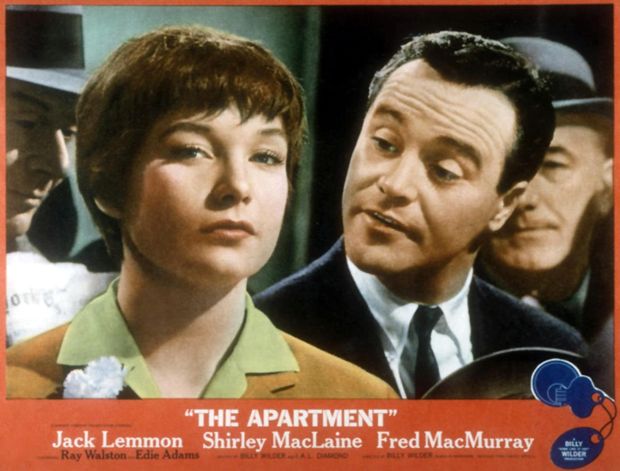
As I say, a lot of present-day ideology has become involved in the
critical reception of this Broadway revival of Promises, Promises. No
matter that, however, Variety reports that Promises, Promises is a
commercial success. The weeknight performance my wife Mary and I
recently attended was sold out, not one empty seat; and the audience
was overwhelmingly appreciative, interrupting the show frequently and
offering the cast a long standing ovation at the end.
For myself, Promises, Promises is a little story, about a “little guy”
who wins the girl — because he really loves her and doesn't use her —
and therefore a big story. In drama, so goes my notion, when a
personal story is well and compassionately told, that story becomes a
big story. On the other hand, attempting to weight a personal story
with ideology, especially pre-conceived ideology, diminishes the
attempt.
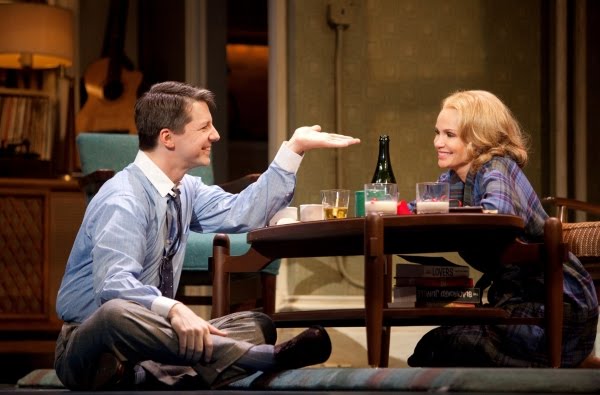
Promises, Promises narrates the disillusionment of a “little guy” at
Consolidated Life, whose crush on a “little” fellow employee turns out
to be a crush on the mistress of his married boss. C. C. Baxter's sweet
and selfless crush on his “angel in the centerfold” ( reluctant
mistress to the unscrupulous Mr. Sheldrake) is crushed in the first
act, and on Christmas Eve! However, when Miss Kubelik tries to commit
suicide out of her own disillusionment with Sheldrake — after a sorry
tryst in C. C.'s apartment — things both fall apart and come together.
Baxter shows real love for his true love, who seems hopelessly and all
the time in love with another man. With the merciful intervention of a
kind and honest doctor who lives next door, together with C. C.'s urgent
rising to the occasion of her overdose, Miss Kubelik rises from the
dead, or the near dead.
This love from a real and kind man, C. C.
Baxter, as compared with the cynicism and selfishness of boss
Sheldrake, touches her, and finally wins her heart. The curtain “clinch” is credible, unsentimental, and very, very touching. It is
made even more credible by the reprise, this time with a positive
vibe, of Bacharach and David's famous song “I'll Never Fall in Love
Again”.
Why does the audience cry at the end? Why was the applause sustained
and very loud? Why did the people leave moved, and happy? I think
it's because the love of C. C. Baxter and Fran Kubelik is a universal
story enacted within a particular case. C. C. wins Fran. He saves her
life, both physically and emotionally; and at the very moment when her
long, passionate, hopeless affair with Sheldrake is exposed — at the
very moment! This is a little story about little people. It is
therefore big. Why? Because it's about everybody. Everybody knows
about the little guy. Almost everybody, male and female, is now or has
at some point been the little guy. It comes with being born.

There are a lot of theatrical touches to Promises, Promises that are
worthy of comment. The notorious Christmas Party song entitled “Turkey
Lurkey Time” is a number people seem either to hate or love. Mary and
I happen to love it. I think we could say we LOVE it. “Turkey
Lurkey Time” is just so unusual. Is it about men being turkeys? Mary
thinks so. Is it about the Christmas turkey, soon to lose his head?
Well, yes. Is it a song about the sheer euphoria of Christmas revelry
and drunkenness? Yes, too. Is it a smashing production number with
great ensemble dancing and an unpredictable finish? Yes, that, too.
Anyway, “Turkey Lurkey Time” has to be seen and heard to be believed;
and I, for one, am still singing it. (I made a mistake in the lobby at
the end, as we were leaving the theater. I was too cheap to buy the T-shirt of “Turkey Lurkey Time”, with snowflakes against a brown
background. Heaven: and I missed it.)
Then there is the unexpected moment of compassion for the “villain”,
J. D. Sheldrake. He sings a song entitled “Wanting Things”, about his
compulsion for wanting things he cannot have. The subject of the song
is what theology calls “concupiscence”. As he tolls his confession,
shadows of the several women in his life, all in scarlet but
half-hidden by the lighting, approach him, then slowly walk away, and
vanish. The number is haunting, and also even-handed. No person is
completely a villain.
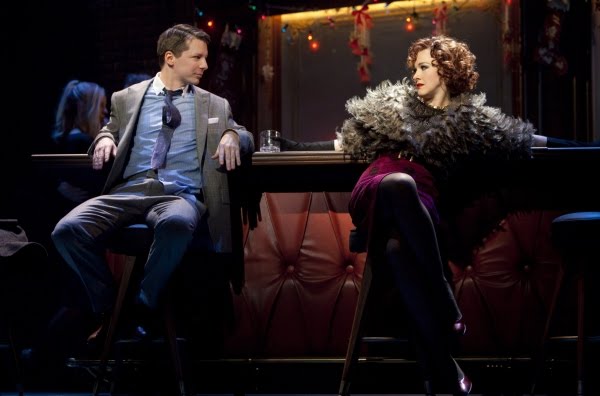
The producers of Promises, Promises have added two songs from the
Bacharach-David repertoire to their revival of the show. One of them,
“A House Is Not a Home”, has to be one of the great American pop
songs. Both lead characters, Fran and Chuck (C. C.), sing it in
separate contexts, at different points in the narrative. It is almost
unbearably affecting. The actress Katie Finneran (above) also has a star turn
as Marge MacDougall, the woman Chuck picks up in a bar on Christmas
Eve just after he has learned the truth about Fran's affair with
Sheldrake. Critics of the show who panned it otherwise, mostly for
ideological reasons of one kind or another — you can adore Mad Men
but you can't say a good word about Promises, Promises — loved Katie
Finneran's extraordinary scene. You have to agree with the critics
about the scene, and the actress. But it's also true that Sean Hayes,
the lead, reveals a comic brilliance and timing as C. C. Baxter; and
Kristin Chenoweth has a lovely voice and compelling stage presence.
(To me the actress seems a little petite for the role, given the
slightly tough persona she is supposed to have.)
Two other things to mention:
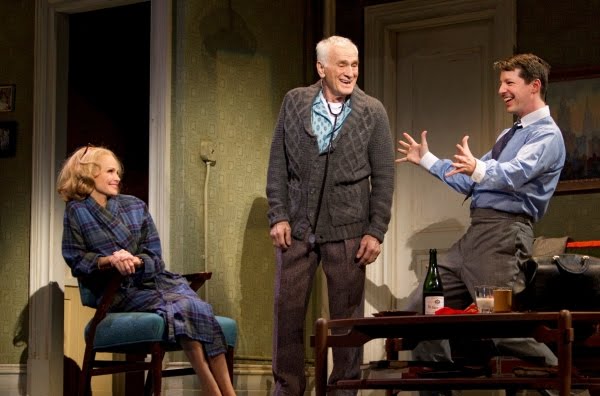
The character of Dr. Dreyfuss is played by Dick Latessa (above, with Chenoweth and Hayes), who puts this
role on the map. Dr. Dreyfuss is the physician/wise man/priest of the
play and even invokes God, sincerely, in a moment of crisis. Also, the
number, “Where Can You Take a Girl?”, which is reprised twice by an
enthusiastic quartet of young executives, is comic and even slapstick.
We would wish to believe that the kind of thinking expressed in the
song doesn't take place any more. But it does, whatever one's moral
judgments are. It's just that today the targets are not “secretaries” but “part-time staffers”, or “interns”, or “campaign workers”, of both
sexes. “Where Can You Take a Girl?” is a spoof. Everyone in the
audience laughed, even if they didn't quite want to.
Visually, the play is saturated in early '60s office decor. (Think
kidney-shaped ash trays.) The art direction reminded me of Frank
Tashlin's 1957 Will Success Spoil Rock Hunter?. But the props don't overwhelm the story and the music. The
choreography is terrific. The dancers and their costumes look right to
the period, and they're not small bodies. Yet there are also not too
many of them. The high points of the dancing occur at the very
beginning of the play and during “Turkey Lurkey Time”. (As far as I am
concerned, you could almost rename the show “Turkey Lurkey Time”, that
song is so eccentric and memorable.)
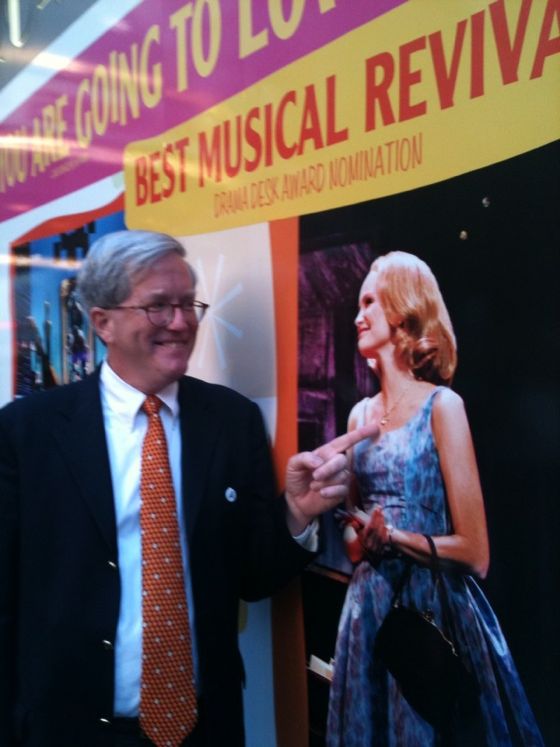
Mary and I had a blast. It's rare you do something on an impulse —
like getting on a plane within a few hours of deciding to go, with the
sole purpose of seeing one show you hope you're going to like — and it
works. Promises, Promises works. It works on almost every level. If
you are going to take offense — at anything — on purely ideological
grounds, I guess you could infer something you didn't like. That may
be true of almost any piece of popular art. But I think it would be
doing an injustice, here, to the combined talents of Billy Wilder and
I.A.L. Diamond, of Burt Bacharach and Hal David, of Sean Hayes and
Kristin Chenoweth, Dick Latessa and Katie Finneran; and of Neil Simon.
Together they bring together a story of a little yearning man and a
little beat-down woman (Kerouac's understanding of a “beat-ness”),
whose love affair becomes a big story.

Hello, I’m currently in rehearsal as sheldrake in Promises Promises. In the production you saw, did Sheldrake come off as truly in love with Fran or was she just another of his many flirtations?
He came across as somewhat more ambivalent than, for example, Fred McMurray did in “The Apartment” — that is, a little more sincere in relation to Fran.
I think I might say, caught in his own trap.
Thank you. I appreciate your taking the time to reply.